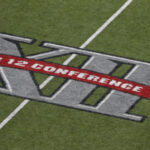It didn’t take long for the audience metrics to justify Fox’s strategy of stocking its Friday night shelf with college football.
It took one night, in fact.
Kansas State’s lopsided victory over Arizona last week averaged 2.58 million viewers on Fox and easily surpassed the typical audience for the WWE’s Friday Night SmackDown, which previously occupied the network’s primetime window on Fridays.
That’s 330,000 more viewers than SmackDown averaged in its most recent season, according to Sportico.
And there’s more football to come.
The Big 12 matchup from last week will give way to nine consecutive Friday night games featuring Big Ten conference games, followed by a return to the Big 12 for a Black Friday broadcast between longtime rivals Utah and UCF.
In all, the former Pac-12 teams now in the Big Ten and Big 12 will fill nine of the 22 slots on Fox College Football Friday broadcasts carved out of 11 weeks this season. Oregon, Washington and UCLA will make two appearances on Friday night. USC, Arizona and Utah will make one.
Fox and ESPN have broadcast college football on Friday in the past, with Pac-12 games taking a leading role. But Fox took the commitment to a new level this year after concluding that SmackDown wasn’t generating the desired audience or advertising dollars.
“In one move, they save money on WWE rights and simultaneously leverage their existing college football portfolio into a new primetime night that will be better received by advertisers (college sports vs. pro wrestling),” media industry analysts John Kosner and Ed Desser, who work together, explained in a joint email to the Hotline.
The Friday night broadcasts also provide Fox with an ideal lead-in to its premier college football matchup of the week the following morning with the Saturday ‘Big Noon’ game.
This week’s broadcast of No. 22 Illinois at No. 24 Nebraska on Friday, for example, will allow Fox to promote the Saturday matchup featuring Marshall and No. 3 Ohio State, one of the biggest ratings drivers in college football.
And as an added benefit, the Friday broadcasts are free.
“They would have produced these games anyway, and the (media) rights are already paid for,” Kosner and Desser wrote.
Shifting landscape
The push to broadcast college football on Friday night is part of a larger shift as live sports slowly take over the weeknight television windows long reserved for scripted comedies and dramas.
For example, the NBA’s new media contract, which begins in 2025-26, will feature Tuesday night games on NBC.
“This is part of a broader move in sports broadcasting,” Kosner and Desser explained. “Fans are going to see sports on network prime time virtually every night of the week.”
And don’t be surprised to see the networks eventually broadcast sports during weekday afternoons.
The eyeballs are available, especially with more people working remotely in the post-COVID era. And the success of the Olympics — not only in primetime but also during the work day — is evidence.
Kosner and Desser believe there will be “more and more live events in the afternoon.”
And ominously, they expect the NFL “to at least explore” the possibility of broadcasting a weekly Friday night game when the next broadcast contract cycle begins in the early 2030s.
The Sports Broadcasting Act of 1961, which shields high school football on Friday and college football on Saturday from the NFL behemoth, could be challenged.
The ratings game, show locations, etc.
— Colorado’s victory over Colorado State last weekend drew 3.25 million viewers on CBS — a long way from the 9.3 million who tuned in for CU’s overtime escape from the Rams last year on ESPN. It was “the least-watched Buffaloes game on broadcast television in the Deion Sanders era,” according to SportsMediaWatch, which tracks audience data.
— UCLA’s first Big Ten game was a dud on the field — the Bruins were blown out by Indiana — and didn’t fare much better with viewers. It drew a meager 1.29 million viewers in NBC’s 4:30 p.m. window.
— The Civil War duel basically doubled that viewership with 2.82 million viewers on Fox (in the 12:30 p.m. window) despite Oregon’s blowout win over Oregon State.
— This week, ESPN’s ‘College GameDay’ will air live from Norman, where Oklahoma hosts Tennessee. If you’re scoring at home, this marks the show’s third broadcast from an SEC campus in four weeks.
— Fox’s ‘Big Noon Kickoff’ will set up shop in Columbus for Ohio State’s matchup with Marshall. It’s the show’s third broadcast from a Big Ten campus in four weeks.
Viewer’s guide to Week 4
Not an ideal weekend for marquee matchups with a number of ranked teams idle (Georgia, Alabama and Oregon, to name three) and with so many teams from the ACC and SEC facing non-conference opponents.
Here are the best bets for your viewing pleasure.
(Listed chronologically. All times Pacific.)
1. USC at Michigan (12:30 p.m. on CBS): The top matchup in the Big Ten — and USC’s first trip to the Big House since 1958 — is a playoff elimination game for the Wolverines and a statement opportunity for the Trojans. The expected coast-to-coast audience is exactly what Fox envisioned when it approved the Big Ten’s raid of the Los Angeles schools.
2. Utah at Oklahoma State (1 p.m. on Fox): Cam Rising should be in the lineup for the Utes in what could be the game of the day. How will it fare head-to-head against the Trojans and Wolverines?
3. Cal at Florida State (4 p.m. on ESPN2): One team is undefeated and the other is winless and the fact that the Bears are the former and the Noles are the latter just might be a sign of the apocalypse.
4. Tennessee at Oklahoma (4:30 p.m. on ABC): What would have been a major intersectional matchup in past years is the SEC opener for both — and the back end of an ABC doubleheader that starts with UCLA at LSU (12:30 p.m.).
*** Send suggestions, comments and tips (confidentiality guaranteed) to wilnerhotline@
*** Follow me on Twitter/X: @WilnerHotline
Related posts:
 Not Too Early Pac-12 football 2022 preview: Projections for the North and South division races
Not Too Early Pac-12 football 2022 preview: Projections for the North and South division races

(AP Photo/Ross D. Franklin, File)
Business of Sports -The Pac-12 came out in favor of CFP expansion after voting against it. Let us explain.
(AP Photo/Marcio Jose Sanchez)
Wilner Hotline – Pac-12 leadership under Kliavkoff taking root
(AP Photo/Tony Gutierrez, File)
Analyzing the value of the ‘Allstate 12’ conference (if the Big 12 makes a giant leap with naming rights deal)
